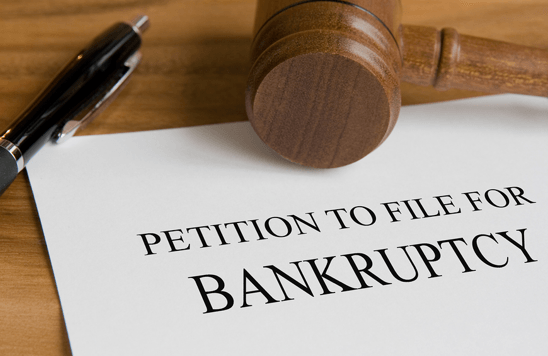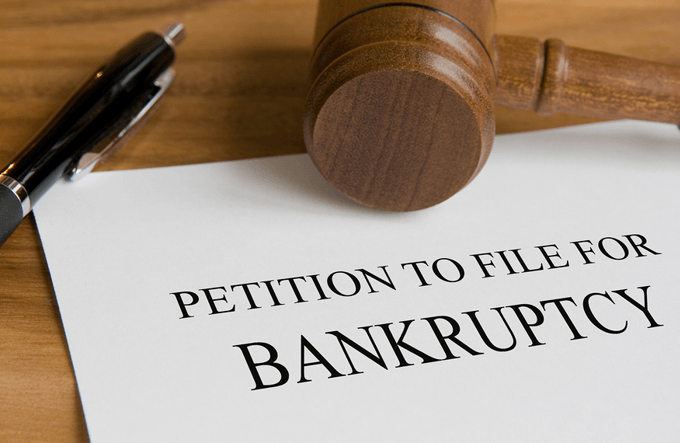Overview: Definition of Bankruptcy
How does bankruptcy work? If you have found yourself asking this question, you or someone you know is likely facing a financial challenge.
This may be due to loss of a job, a medical emergency, divorce, or unexpected emergencies. Your emotions may be running high, and making informed decisions about what bankruptcy means for your future can be a struggle.



Image Source: Definition of Bankruptcy
In this guide, our goal is to educate you on the definition of bankruptcy, how bankruptcy works and how long bankruptcy takes so that you are well–informed before making any decisions.
How Does Bankruptcy Work?
The first step in understanding how bankruptcy works and determining if it is the right option for you is to understand the definition of bankruptcy.
According to Investopedia, bankruptcy is “a legal proceeding involving a person or business that is unable to repay outstanding debts.” Bankruptcy petitions are typically filed in an effort to overcome some of the tremendous debt when the debtor is no longer able to keep up.
What does it mean to file bankruptcy? Once a debtor has filed for bankruptcy, the courts will evaluate all of the debtor’s assets to determine if any possessions can be sold to help pay off the outstanding debt prior to determining how much debt may be forgiven. When a debt is forgiven, the debtor is no longer required to pay off those debts.
When looking at the definition of bankruptcy, you find it is broken down into different chapters per the United States bankruptcy code with the most common being chapter 7, chapter 11, and chapter 13.
How Does Chapter 7 Bankruptcy Work?
Chapter 7 bankruptcy is often the last resort as not all debtors are eligible to file for this classification. What does it mean to file for Chapter 7 bankruptcy?
Some of your property will be liquidated in an effort to cover some of your debt. Not all property must be sold. Property considered “protected” or “exempt” under your state laws may not be sold to cover the cost of debt pay off.
Certain items that are considered secured debt require you to make a choice based on the definition of bankruptcy for chapter 7. This includes things like cars with loans secured on the vehicle and mortgages on homes. Your choices include allowing the creditor to take back the property, continuing payments, or negotiating a lump sum settlement.
How does chapter 7 bankruptcy work for those who have sufficient disposable income to cover a repayment plan? Not everyone is eligible for Chapter 7 bankruptcy.
If you are a disabled veteran who accumulated your debt during active military duty, an individual whose primary debt comes from the operation of a business, or your average monthly income falls below the median income set up by your state, you automatically qualify for chapter 7 bankruptcy regardless of whether or not you meet the income criteria.
All-in-One Change Management Tools
Top Rated Toolkit for Change Managers.
Get Your Change Management Tool Today...
If, however, you do not fall into one of those categories, what does bankruptcy mean? At this point, you will be required to pass a means test. If you do not pass, you will be required to file chapter 13 bankruptcy instead of chapter 7.
How does the means test for bankruptcy work? By taking a specific set of your monthly expenses and subtracting that from your average monthly income. If it is determined that you still have enough disposable income to pay off at least a portion of your unsecured debts, you fail the means test.
While you may qualify to file chapter 7 based on exemptions or the means test, that isn’t always the best option. Be sure to discuss with a qualified attorney what Chapter 7 bankruptcy means for you.
Don’t Miss: What Is Debt Consolidation? – Is It Good Or Bad? (Ways To Consolidate & Explanation)
How Does Chapter 13 Bankruptcy Work?
The definition of bankruptcy changes somewhat from chapter 7 to chapter 13. Whereas chapter 7 bankruptcy was designed to eliminate debt that could not be paid off, chapter 13 is meant to help the debtor reorganize their debt into more manageable terms. How long bankruptcy payoff takes depends on circumstances, but typically not less than three years and never longer than five years.
So, how does bankruptcy work to pay off your debts? How much do you have to repay? Because chapter 13 is a reorganization and not an elimination of your debts, there will be certain debts that must be paid in full; these priority debts include mortgages, car loans, government-orderedpayments such as child support or alimony, as well as certain tax obligations.
How does bankruptcy work to pay off non-priority debts?
Debts that do not fall into the priority category typically include credit card debt, medical bills, back utilities, and personal loans. Typically, the creditors will receive a portion of the total debt owed based on the amount of disposable income remaining after priority debts are covered.



What Does Filing for Bankruptcy Mean?
The first official step in bankruptcy is filing the paperwork and paying a fee. This is often done through a lawyer or legal service but can be done without such professional assistance. Generally, you have reached this point when you have exhausted all other possible avenues of repaying your debt.
Once you have filed the paperwork, you will receive an automatic stay, which bars your creditors from pursuing further action to collect a debt from you. You will also be assigned a trustee. The trustee works as an agent for your creditors, verifying that the information you have provided is accurate.
As part of how bankruptcy works, you will have at least one meeting at court with the trustee to review your case information. However, if you dispute any claims a creditor may have against you, you may file objections against those liens or debts.
How long does bankruptcy filing take? Once the paperwork is completed, filing is just a brief step in the time frame of your bankruptcy proceedings.
Related: What Is Brexit? – Get The Definition & Review (Britain Leaving EU?)
How Long Does Bankruptcy Take?
According to definitions of bankruptcy set up by the United States, there is a specific process required to file for bankruptcy, and how long bankruptcy takes will depend on this process.
Credit Counseling
Prior to filing for bankruptcy, you must receive credit counseling from a federally approved agency. You can find a list of these agencies at the United States Trustee’s office. These agencies will help you to attempt to pay your debts without filing for bankruptcy and give you a better understanding of what bankruptcy means for you and your credit.
While these credit agencies are permitted to charge a fee for their services, they are also required to offer free or reduced rates to those who can’t afford these fees.
How long does bankruptcy credit counseling take? This is usually a 60- to-90 minute counseling session.
Repayment Plan
How long bankruptcy payoff takes will be determined by your repayment plan. Within 30 days of filing paperwork for bankruptcy, you will begin making payments under an agreed upon repayment plan. This can begin even prior to meeting with the trustee in court. Depending on the outcomes of the court meetings and any possible objections that may be filed, this plan may be modified.
How long does bankruptcy repayment plan take? Your repayment plan can take between three and five years and must include your “best efforts” to repay all debts.
Debtor Education Course
As part of your bankruptcy judgment, you will be required to complete a personal finance course by an approved agency.
How long does bankruptcy debtor education take? This can be done while you are in the process of your repayment plan and is a two-hour class.
Discharge
Once you have completed the repayment plan and your personal finance course, there may be a final court appearance called a discharge hearing where the case will be discharged and your bankruptcy completed.
In total, how long a bankruptcy takes is usually between 36 and 60 months from the time you have filed.









How Often Can You File Bankruptcy?
How does bankruptcy work if you have previously filed for bankruptcy? For chapter 7, the definition of bankruptcy states that you cannot get another bankruptcy discharge if you received a chapter 7 discharge within the last eight years or a chapter 13 discharge within the last six years.
For chapter 13, the definition of bankruptcy and the limits of when you can file a new case are a bit different. You can file chapter 13 bankruptcy after previously filing every two years from the date you last filed (NOT the date you completed the repayment plan). In that case, you are able to file a new case while still in the repayment phase of a previous bankruptcy filing.



Image Source: Filing for Bankruptcy
However, if you previously filed for chapter 13 bankruptcy and now want to know how often you can file chapter 7 bankruptcy, you are not permitted to file a new chapter 7 bankruptcy claim within six years of the date your chapter 13 bankruptcy was filed—unless you paid all of your unsecured creditors in full or can prove that you paid at least 70% of the claims and that represented your best effort.
Popular Article: From Basel I to Basel III – Overview of the Journey (Basel 1, 2, 2.5 and 3)
What Does It Mean to File for Bankruptcy?
While it may sound enticing to get creditors off your back and stop harassing you, there is a price for filing bankruptcy. What does it mean to file for bankruptcy when it comes to your credit and future financial situation?
Despite what you may think about how bankruptcy works, bankruptcy does not eliminate all of your debt, even in the case of chapter 7. There are still debts that will be owed such as student loans, child support, and any assets you wish to retain. It is important to have a realistic understanding of what bankruptcy will do to help you alleviate your current financial situation.
What does bankruptcy mean for your credit score? Your credit score affects more than just how much interest you pay on your credit card, mortgage, or car loan. According to CreditKarma.com, credit scores are also used to determine rates for auto insurance, amounts for security deposits on homes and apartments, and payment plans with utility and cell phone providers.
What does it mean to file for bankruptcy? Credit reporting agencies such as Experian, TransUnion, and Equifax will report the bankruptcy on your credit report for seven years (in the case of chapter 13) or 10 years (in the case of chapter 7). Affecting your credit through bankruptcy can have long-term financial implications.
In Summary
Should you file bankruptcy, you will spend between 36 to 60 months of concerted effort repaying your existing debt. Whether you choose chapter 7 or chapter 13 bankruptcy will require that you have a plan and follow the steps.
Your credit score, which is used in a variety of situations, will be affected for at least seven years. However, if you have exhausted all other avenues and just do not have any other way to pay off some or all of your debt, then filing for bankruptcy could reduce some of the stress and pressure to allow you to finally get your head above water.
The choice is a weighty one with long-lasting consequences. Seek out articles like this one and professional advice before any sort of drastic financial changes.
Read More: The Sarbanes Oxley Act – 2002 (Overview & Summary of SOX)
AdvisoryHQ (AHQ) Disclaimer:
Reasonable efforts have been made by AdvisoryHQ to present accurate information, however all info is presented without warranty. Review AdvisoryHQ’s Terms for details. Also review each firm’s site for the most updated data, rates and info.
Note: Firms and products, including the one(s) reviewed above, may be AdvisoryHQ's affiliates. Click to view AdvisoryHQ's advertiser disclosures.





